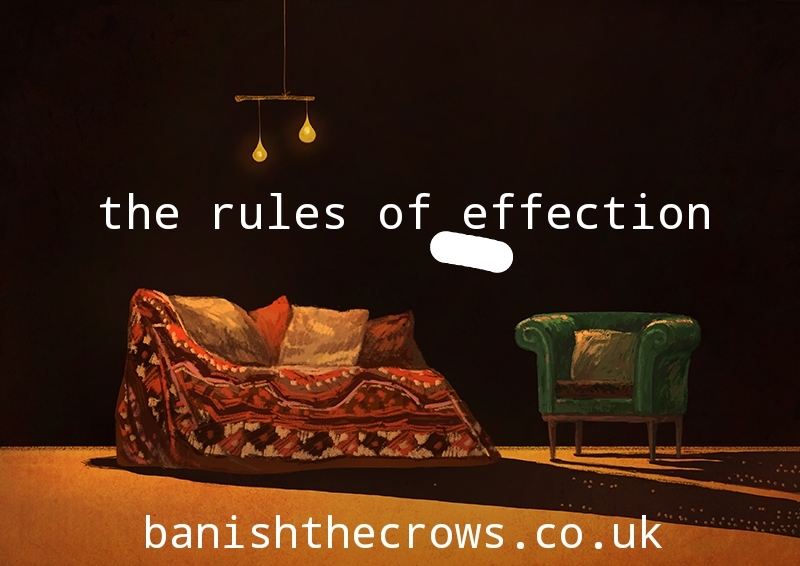
26 Jan The rules of effection in counselling and psychotherapy
This blog shares my code of belief about the things that I believe help to make counselling and psychotherapy an effective ‘treatment’, for example, when we experience feeling overwhelmed or unhappy with aspects of our lives, are anxiously uncertain about the future or who we are anymore, or are struggling with loss, adjustment or general unease.
The word effection of course does not exist in the English vocabulary – I offer it here as a ‘blended word’ or ‘portmanteau’, which I frequently got into trouble for doing during my two University experiences! So, in doing so, I blend the word effect – to cause an outcome, a result, with affection – warmth, responsive, caring. For me, effection is “to produce a positive outcome together with another person through offering them genuine and unconditional acceptance at a time when it matters most”.
There are many variables that will affect whether therapy is a successful endeavour – as a service for and involving human beings we are constantly challenged by uncertainty and unknowing. This being as applicable for the therapist as it is for the person seeking help.
Here are eight things that I believe to be essential and will aid counselling and psychotherapy as a worthwhile, efficacious treatment option. Of course, I won’t be the first nor the only therapist to believe these foundations to therapy as a ‘truth’ and my words draw on the ideas and experiences of others. However, I do believe that if these foundations exist as the basis for therapy, then together with the therapist’s knowledge, skills, and attentiveness, almost anything can become possible for the person seeking help.
The eight foundations:
- A ‘connection’ between the therapist and the person seeking help is possible, and happens. I believe that you will know this within the first 10 or 15 minutes of being together.
- The person seeking help is able to acknowledge and communicate their anxious, vulnerable state – they know things in their life or the way that their life is being lived or experienced needs to change.
- The basis of the therapy is what happened to you rather than what is wrong with you. This slant in therapy and experiencing being a valued and prized ‘human being’ rather than being perceived (or perceiving the self) as a ‘broken object’, is undoubtedly fundamental to a person’s hope for change and recovery and this coming about.
- The person giving the help communicates their genuineness, their acceptance for the person seeking help, and is able to witness things from that person’s frame of reference – to momentarily ‘step into their shoes’ and know how that might feel, what being you might be like.
- The person seeking help is able to receive and experience the therapist and their intentions, as above, and allow trust and confidence in them, and the self, to build.
- The person seeking help is ‘psychologically minded’, which refers to a person’s capacity for self-examination, self-reflection, introspection and personal insight. Not necessarily crucial but nonetheless helpful. Additionally, the person seeking help needs to be patient with the process of therapy.
- The setting that therapy takes place in is safe, secure, and private. The way that the therapist works in that setting will need to promote and uphold confidentiality but be realistic of anything that might compromise this.
- The person seeking help experiences being known, heard and believed.
If you are ready to talk, we are ready to listen.
Contact us at:
M: 07791 524 634
E: jeremy@banishthecrows.co.uk



Lynne Harmon
Posted at 08:23h, 07 FebruaryIn a world where being known, heard and believed can be a challenging thing to find sadly, to hear this message is in itself therapeutic. Searching for one who can enable us to assume our true identity with confidence, is something we have from our early attachments been seeking out. I myself, knowing the challenge and fear of showing vulnerability, welcome the insight shown here that normalises my anxiety and embraces the challenge of unlocking the fear through acceptance and relationship.
John Bowlby says much about early attachment that resonates with the points in this posting. Both Bowlby and Klein would be right behind the idea of of these foundational aspects of therapy.
jeremy
Posted at 09:23h, 07 FebruaryThanks for your insightful and supportive response, Lynne. My experience of feeling and being known by another has been similarly powerful. Anecdotally, I understand from many clients the power of this beyond the more complex theoretical and technical attributes in therapy.
Rebecca Jones
Posted at 13:36h, 07 AprilI personally love ‘effective’ . A great way to describe the elements therapy I feel are integral.
Drawing from my own experience as client and my reflections on how my past have influenced my present, the experience of being heard, listened to, my thoughts and feelings valued- myself valued without needing to trade anything (more precious than money) of myself in return have been eye opening. Empowering. Bordering on uncomfortable, as unfamiliar often is.
I can definitely hear echoes of attachment and object relations in my process and in my meaning making. It helps. Thank you.
jeremy
Posted at 22:54h, 07 AprilHi Rebecca, it’s great that you found this blog that I posted a couple of years back! I sometimes forget that they are still here so it is heartening when somebody has had a look through some of the posts that I have made and finds them useful. Thank you for taking the time to read and comment, as you have. Go well – ‘shine brightly’! Jem.